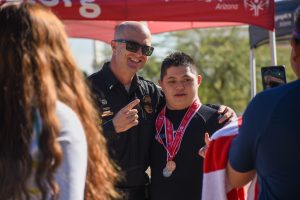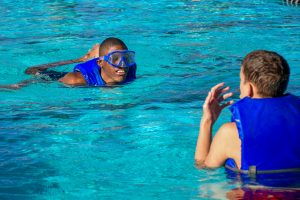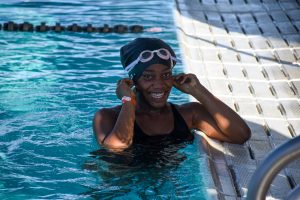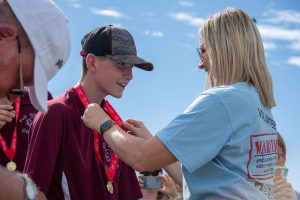- Slug: Sports-Special Olympics Arizona, 1,000 words.
- 5 photos available.
By Mary Grace Grabill
Cronkite News
PHOENIX – At times, Jacob Cohen, 20, felt displaced from his community. He would stay home all day, had few friends and kept to himself.
Living with autism made Cohen’s days challenging. Then Unified Sports entered his life.
“Jacob has been able to meet other adults like himself and make some new friends,” his father, Travis Cohen, said. “The Special Olympics also taught him about being part of a team and keeping his commitments to others.”
Unified Sports, a program established through Special Olympics, puts people with intellectual disabilities and those without on teams together to promote social inclusion and mutual respect.
Special Olympics defines a person with intellectual disabilities as one with “certain limitations in cognitive functioning and skills, including communication, social and self-care skills.”
Unified Sports has given Jacob friendships and provided physical activity opportunities. He communicates with teammates over the phone, allowing him to make friends with people that have the same interests as him.
“Now that he has been in Unified Sports, he has kept in touch with some of his classmates that also participated, and he regularly calls them and talks with them,” Travis said.
Maria Beckman, Unified Sports coordinator for San Tan Foothills High School and Jacob’s special education teacher, was a vital instructor and piece in Jacob’s life. She has made life easier for the Cohens and encouraged Jacob’s brother, Joshua, to participate in the Unified program. They played on the same team for three years, thanks to Unified Sports.
On Jacob’s senior night at San Tan Foothills, he was recognized as an athlete, a moment Travis will never forget.
After high school, Jacob and his family looked for ways to continue participating in athletics. Special Olympics Arizona (SOAZ) has played a pivotal role as Jacob recently began competing with the Tri City Miners team, a year-round Unified Sports team.
Unified Sports is just one of the many opportunities that allows individuals with intellectual disabilities to participate in athletics and the opportunities keep growing. In 2011, SOAZ and the Arizona Interscholastic Association, the governing body of Arizona high school sports, partnered up, allowing those with intellectual disabilities to participate in sports with their schools.
SOAZ provides a variety of opportunities, allowing individuals to participate in low- or high-impact sports. Robyn Simpson, digital resources and operations coordinator, has for two years worked at Special Olympics Arizona, continuing her involvement from her time in high school of creating opportunities to grow the community.
“We have virtual programming that includes various activities including yoga, bingo, Among Us game play, Friday family fun nights where we play games, and others,” Simpson said. “We also have an esports league where athletes from all over the state can play in video game tournaments.”
On top of these activities, SOAZ provides free health screenings for athletes at competitions. Having certified clinicians come out to events allows athletes to receive care in a more comfortable setting.
“Taking (the doctors) out of the white coats and seeing our athletes there in more fun environments is so vitally important,” CEO and president of Special Olympics Arizona Jamie Heckerman said. “Our athletes get free prescription glasses and sunglasses. They get new shoes if they need them, new hearing aids. They even do dental extractions on site for some of our events if needed.”
Over the years, SOAZ has continued to thrive. A year ago, progress was halted by the COVID-19 pandemic, causing the activities to be participated from home.
“We went to virtual programming, and while that’s good for some, it’s not good for all,” Heckerman said. “There is definitely a lack of access to technology, a lot of our athletes don’t know how to utilize technology, or don’t have the family support system to be able to do that. We lost a lot of contact with our community.”
As a result of COVID-19, SOAZ is working on creating a database to be constantly connected with its athletes. It would allow communication for people who leave their school or move out-of-state.
The effort heavily relies on volunteers, More than 20,000 dedicate time and support, ensuring athletes have the best experience at practices, games and events.
SOAZ also relies on donations and fundraising, as 95% of money raised goes “directly back to programs for our athletes,” Heckerman said. This ensures that athletes do not have to worry about paying any bills for participating with the organization.
Many events are resuming in person and the Law Enforcement Torch Run (LETR) is one of those. It has raised over $600 million for Special Olympics programs, making it one of the largest fundraisers in the nation. In Arizona, the LETR has raised over one million dollars.
Darin Eccles, the Pinal County Sheriff’s Office coordinator, has been a part of the SOAZ community for about 15 years and a primary leader in coordinating the LETR event. He said he uses every asset he has access to, ensuring the event can raise awareness for the organization and cause. Another fundraiser Eccles participated in for SOAZ was the Fuel of Dreams, sponsored by Fry’s.
Being able to participate in activities and fundraise for SOAZ has been life-changing for Eccles.
“When I was handing out the medals, one of the athletes stopped as I was putting the metal around his neck, he gave me a big hug and gave me a big kiss on the cheek. And from that time forward, I was hooked on Special Olympics,” Eccles said.
Eccles is one of the thousands of individuals that has made efforts to provide an opportunity to not let intellectual disabilities stop people from living life to the fullest.
“It’s great to be reminded of why we do what we do, and see how happy it makes our athletes,” Simpson said. “They are so happy to be back in person that any event we do, the energy is electric. We’re just so happy to be here and be with each other.”
For more stories from Cronkite News, visit cronkitenews.azpbs.org.




